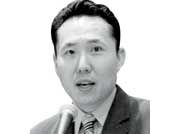Sandy’s leadership lesson
For some crazy moment on Monday when “Frankenstorm” Sandy was threatening to tear a hole in our roof and I was sure we would lose power, I remembered a funny cartoon from the summer when a freak “Derecho” storm did rob us of power for two days. It featured a series of text message balloons going back and forth among Facebook, Google, the Internet, and electricity.
Facebook started the text message chain by bragging, “I know everybody.” Google chimed in by replying, “I can find anything.” The Internet then scoffed, “Without me, you are nothing.” Then electricity smacked down the law saying, “Keep talking you bitches.”
How crudely true. We don’t realize how dependent we are on electricity ― and how fragile our dependency is ― until we lose power for a few days.
At least, we were lucky in northern Virginia where I live. Our lights flickered on and off every 15 minutes or so throughout the day when Sandy hit, but never went out. Thank God. I can’t imagine what we would have done without electricity for a few days, especially with a 1-year old baby.
Others were not so lucky. One 30-year old, who was engaged to be married, was killed in Flushing, Queens in New York when a tree fell on his house. Just imagine the abrupt, arbitrary nature of his death. One moment, you are young, happy, engaged, reading a book, sleeping, or doing any host of everyday things that you have always done; the next moment, you are dead from a tree that fell on top of your house.
Reading about this tragedy reminded me of my freshman year at college when a dorm mate was killed when he fell from a tree. He was a quiet but friendly Japanese guy ― Aki, I think his name was ― who climbed the tree to retrieve something stuck in it on behalf of a friend and fell to his death. I remember going to his open casket wake and seeing his bloated face, so unlike how I remembered him looking, and thinking to myself how weird and abrupt death was. One day you are here eating, talking and laughing and the next day, you are not. And you have no control on when you live or die.
You might not think it but the abrupt arbitrariness of death is actually one of the most fundamental leadership lessons. It is truly God’s will, or some universal chance, that is allowing you to live on. This leads to the shocking recognition that your tomorrow is not guaranteed. In fact, no one’s tomorrow is guaranteed. In short, you have absolutely no control over the thing that matters the most: your life.
Once you really internalize this recognition, you will be awestruck with absolute humility. In Jim Collins’ celebrated Harvard Business Review article “Level 5 Leaders” (2001), he uses as examples great leaders that have undergone significant life experiences that may have triggered this recognition.
Collins writes, “Darwin Smith fully blossomed as a Level 5 after his near-death experience with cancer. Joe Cullman was profoundly affected by his World War II experiences, particularly the last-minute change of orders that took him off a doomed ship on which he surely would have died.”
As we can see from his examples, these Level 5 leaders underwent experiences that allowed them to sense their own mortality. At the same time, they sensed a power beyond their human understanding could take away their life according to some undecipherable reason or chance. To know that one has no choice and zero control over the why, how, when, and where of his death is to be humble.
Fundamental humility is one of the two leadership traits that Collins identifies as critical in a leader who takes a good company to a great company, whom he defines as Level 5 leader. The two indispensable and paradoxical characteristics of a Level 5 leader, Collins explains, are his deep humility and unshakeable professional will. These characteristics are counterintuitive in that personal ambition and strong ego, two characteristics that often typify effective business leadership, actually obstructs one’s rise to Level 5 leadership.
To illustrate the point, Collins says, “Level 5 leaders want to see the company even more successful in the next generation, comfortable with the idea that most people won’t even know that the roots of that success trace back to their efforts.”
In contrast, he further explains that “[lesser] leaders, concerned with their own reputation for personal greatness, often failed to set the company up for success in the next generation. After all, what better testament to your own personal greatness than that the place falls apart after you leave?”
I know that concepts like self-promotion and personal branding are what the professionals tell us we need to advance our careers. And I am sure they are correct in some way. But in the most fundamental way that truly matters, humility and self-effacement are what really make a difference in people’s lives. And that’s what leadership should be all about. Let that be Sandy’s leadership lesson.
Jason Lim has been writing for The Korea Times since 2006. He lives in Washington, D.C. He can be found at Facebook/jasonlim2000 and @jasonlim2012. You can also email him at jasonlim@msn.com. <The Korea Times/Jason Lim>

























































